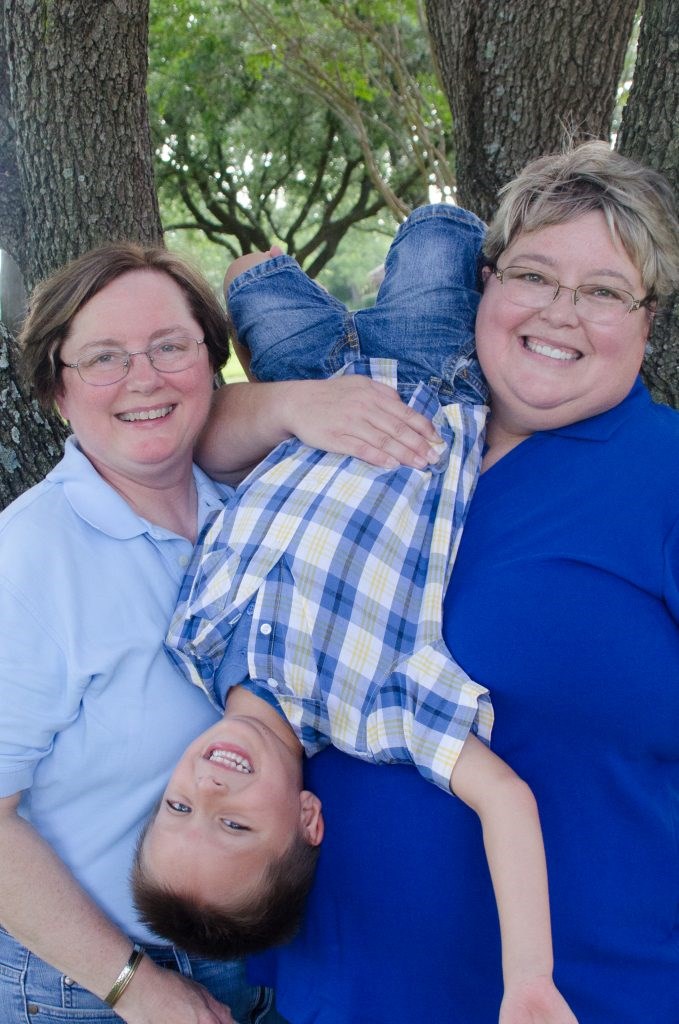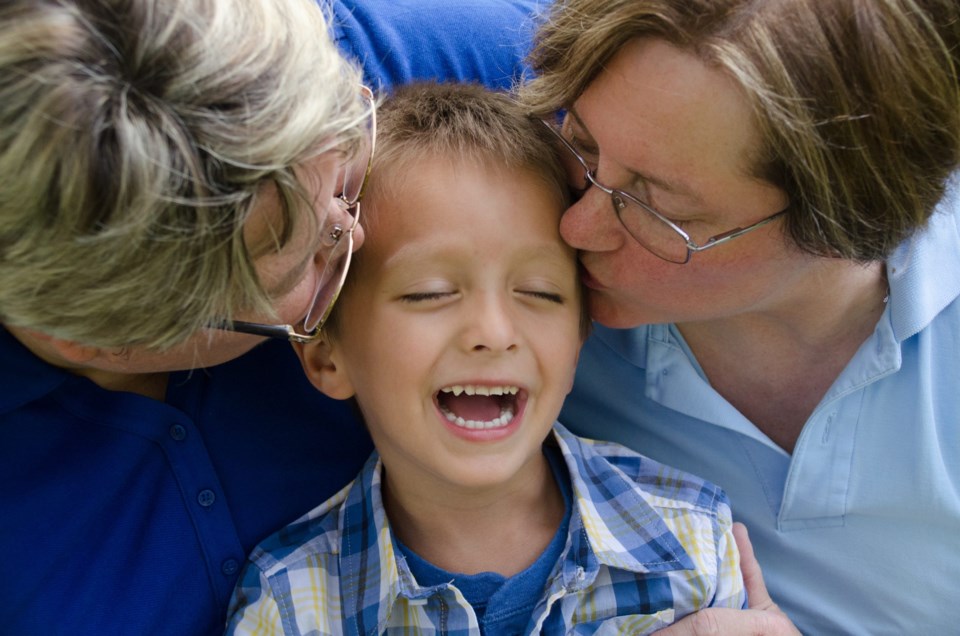We are a normal family of three. As parents we are trying hard to raise a young man with a strong moral compass. I coach soccer while my wife is active in our son’s Boy Scout troop. As neighbors, we try to be there to lend a cup of sugar. As professionals, we have chosen to work for nonprofit organizations that benefit the community. As citizens, we volunteer our time with a variety of community groups. The only thing that makes our family different than most is that we are two women raising a child. Our love makes our family stronger. We don’t ask for anything special, but we do want to be treated equally.
My wife and I moved to Collin County in 1996. It was a very different place then. While Dallas had a thriving LGBTQ (lesbian, gay, bisexual, transgender and queer) community, Plano was very different. We loved the amenities the city had to offer, but we only found LGBTQ resources through organizations in Dallas. While we were ultimately able to find our community, we were quiet and well hidden. We were simply “roommates” to our neighbors. We didn’t hold hands under the table at restaurants. The rainbow clothing stayed in our closets unless we ventured south of 635. If you saw us out in Plano, you would have only seen two friends. It was our own Collin County closet.
A lot of old friends wonder what brought us to Collin County, one of the most conservative communities in a conservative state. The answer was the same as many residents: work. My mother was starting a new business venture and was partnering with someone in Plano. She needed a presence in the office, and I wanted to return to my home state of Texas after attending the University of Arizona and working in the state legislature in Phoenix. My wife was moving to Texas from West Hollywood, California. Her friends and family were certain she was crazy. Culture shock is real.
Through our first decade together, we experienced the same ups and downs of any couple; it was just hidden from all but our friends and close family. While my in-laws all knew and accepted me, the majority of my family did not know the truth. My grandmother went to her grave loving my “roommate” like one of her own, but was deeply troubled over my inability to find a nice man to settle down with and marry. I hated not being able to tell her I’d found my soulmate, but her religious convictions were strong, and I had no desire to upset her in her advanced age. We lived a lie to spare her and other family members from the truth, knowing they either wouldn’t approve or might outright reject us. Being together without sacrificing peace in my family seemed worth the sacrifice. That all changed when I got sick.
In 2002, I was diagnosed with a rare form of cancer. This was the first time either of us had dealt with a serious medical condition. We learned quickly and brutally that the woman I considered my wife had no legal rights. While she cared for me day and night and loved me through nearly two years spent bedridden, if I went to the hospital, she didn’t even have the right to visit. She wasn’t family in the eyes of the law. Despite all the paperwork we filled out, any hospital official could override my decision if they didn’t acknowledge or approve of our relationship. It was sobering, and scary.
No one understands cancer like a caregiver. A caregiver watches their loved one endure the physical toll the disease inflicts. They suffer from the same constant fear of loss and uncertainty. They spend hours sitting in the waiting rooms. They hold hands. They tend to wounds. They do all of it without the benefit of heavy drugs, which can dull the experience to the patient. When people called or visited, the concern was always for me, the patient. Rarely did anyone acknowledge that cancer was affecting my wife deeply as well.
A cancer diagnosis is the ultimate test of “in sickness and in health.” I vowed that if I survived, everyone would know how much I loved this woman. There would be no more hiding who I was, who we were, to make everyone feel comfortable. Our love had withstood the test, and we deserved to live a life true to ourselves.
In 2010, once I was in remission and after regaining our financial footing, we decided to make a move and buy our own home. The wide-open spaces and diversity of East Plano captured our attention. The quality school district made purchasing a home there a good investment, and the neighborhoods were full of individuality and energy. A younger generation was discovering East Plano, and that, combined with corporate transplants, seemed to usher in a wave of open-mindedness and tolerance. With our health and finances back in order, we dared to want for more.
Read more: The City of Excellence is in conflict. What is rotten in the state of Plano?
Becoming parents as a same sex couple is a complicated proposition, especially in a conservative state. We elected to leave the issue of raising children to fate. For years, we had put our wish to be parents out to the universe. Our friends knew we were open to adoption. If it was meant to be, we believed the right circumstance would present itself. In 2012, with 29 days notice, we became parents through a private adoption.
Even though we were the selected family of the birth mother, adoption was neither cheap nor easy. We were advised to not even try to finalize the adoption in Collin County as the family court judges were too conservative and might be unwilling to formalize an adoption involving a gay couple. Even in Dallas County, our attorneys filed in the civil courts, rather than the more conservative family courts. I had to adopt our son as a single parent. In a separate filing, my wife became the second parental adopter. Even now, with gay marriage legal, the process remains the same for adoptions; even if one spouse carries a child, only the birth mother is recognized by law. Her wife must legally adopt their child. Our laws are antiquated and do not serve the best interest of the children we love and care for.
As we moved forward in life, we focused on family. We were happy living in our little slice of paradise and chose to focus less on how ugly people could be outside of our bubble. It was a cold day in December of 2014 when hate walked up to our door. It served as a stark reminder that while the majority of people had come to accept us, we had a long way to go to gain the acceptance of certain segments of society.

We were coming in from a church service in which our then two-and-a-half-year-old had very convincingly portrayed a wise man. It was the first year he was aware of Christmas and he was so excited. He ran to me waving a piece of paper he had pulled off the door. It had red and green text, and he was certain it was another Christmas card he could place on our mantel. Regrettably, it was not.
Another local church had chosen that day to plaster my neighborhood with a flyer regarding their feelings about the recently passed Plano Equal Rights Ordinance (ERO). It spoke of the “militant” LGBTQ agenda and how this “immoral lifestyle” was being “forced down the throats of the people of Plano.” I remember the moment vividly. It was the moment I realized that I had to stand up and speak out for myself and my family. I decided to accept a long-standing offer and become active in the Gay & Lesbian Alliance of North Texas (GALA).
For nearly two decades, GALA has worked to celebrate diversity and enhance equality for North Texas LGBTQ individuals. Over the years, we have forged relationships with local city councils, police departments, school boards, chambers of commerce and other similar groups. By getting involved with our greater communities we hope to be a point of reference when issues come up related to the LGBTQ community. We are grateful for the relationships we’ve built and friendships we’ve established over the years and see progress in our mission every year.
One of my personal goals as a board member of GALA is to provide protections for the most vulnerable among us, the LGBTQ youth. In 2010, the Dallas Independent School District approved an LGBTQ-inclusive bullying policy. At this point in time, none of the major school districts in Collin County offer such protection. According to the School Climate Survey conducted by the Gay and Lesbian Student Education Network (GLSEN), 70 percent of LGBTQ students in Texas say they experienced at least one form of anti-LGBTQ discrimination in the past year. There is no question that a problem exists.
Read more: Pepa Paniagua talks GALA, upcoming legislative session, and being a queer pastor
During the 2017 to 2018 school year, the McKinney, Plano and Allen ISDs all experienced major issues related to LGBTQ students. These incidents involved teacher on student bullying, student on student bullying, and institutional bullying. The Trevor Project reports that lesbian, gay and bisexual students contemplate suicide at almost three times the rate of heterosexual youth. The American Academy of Pediatrics reports that among non-binary youth, nearly 42 percent report having attempted suicide at some point in their lives.
Regardless of one’s religious affiliations or personal views, I think we can all agree that bullying is bad for any reason. With the LGBTQ community ranking third in hate crimes in the U.S. according to the FBI, it makes sense to specifically reference it in district policy. There are many areas of concern for the LGBTQ community that need our attention, but I see none as urgent as this one.
I am proud to serve on the board of GALA and honored to work with my fellow board members. We are gay, lesbian, bisexual, transgender, queer and straight. We represent multiple religions, age groups and races. We are native Texans and transplants. We are single, married and have kids. What we all have in common is a passion to advance equality through educational program development and community outreach.
Twenty plus years has made a world of difference in both our country and Collin County. My wife and I are now legally married, we have a son, and we live out and proud in Lucas. Our wonderful neighbors are very religious, but very welcoming to our family. I won’t lie, we were concerned about moving to a more rural area. We know that not all members of the LGBTQ community are as lucky as we are. We do not take our safety and security for granted. We live during a time when you don’t have to look far to find hate and intolerance. We prefer to look for the love.
The Oxford Dictionary defines pride as a feeling of deep pleasure or satisfaction derived from one’s own achievements, the achievements of those with whom one is closely associated, or from qualities or possessions that are widely admired. There will no doubt be peaks and valleys as we continue to build our lives. I am proud of the family we have become and of the contributions we make to our community. We hope to instill the same values in our son. We are working hard to make our world a better place, and in so doing, we hope our world becomes more accepting and open to families that look different from their own.




![Top 5 Reads Of The Week [August 18 - 22]](https://www.vmcdn.ca/f/files/localprofile/images/food-and-drink/img_7561-2.jpg;w=120;h=80;mode=crop)